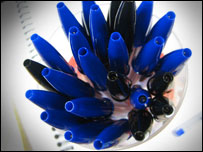 Fifty-seven Bic Biros are sold every second (and then "borrowed" by passing colleagues) - not bad for a 60-year-old product. But did the pens really make that much of a difference?
Fifty-seven Bic Biros are sold every second (and then "borrowed" by passing colleagues) - not bad for a 60-year-old product. But did the pens really make that much of a difference?It was a familiar frustration that led to the invention of the modern ball-point pen - leaky ink.
In 1938, Hungarian newspaper journalist Laszlo Biro noticed the ink used on the printing presses dried quickly and so tried using it in a fountain pen to avoid the problem of leaks, blots and smudges.
But the ink was too thick to flow into the nib. So Biro, with the help of his brother, a chemist, devised a pen tipped with a metal ball bearing that used capillary action to draw ink through the rotating ball.
They brought their invention with them when they fled to the West during a crackdown on Jews later that year. A British firm took over the patent to produce pens for the RAF, and the first Biros went on sale in the UK 60 years ago this week.
Barring tweaks and improvements, the pen is still recognisable as the ball-point Biro devised to make writing easier, and it regularly features in top 100 design lists, says Libby Sellers, the curator of the Design Museum.
"It has worked so well for so long that you stop noticing it. It does what it says it should be doing, like the paper clip and the Post-It note."
But was it revolutionary? "That's a big word, but it made writing easier. No longer did you need to worry about ink spills or refills. To be mobile and reliable are two amazing things to be able to accommodate into such a small and humble object.
"What is remarkable is Biro's lateral thinking in bringing existing technologies together to create an everyday object that everyone could write with. Ball bearings already existed. Quick-drying ink already existed. And so did roller-balls, in deodorants."
Among the first Britons to use the pens were the RAF's fighter pilots, for whom the pens proved something of a revelation.
"Fountain pens can explode or at least leak at high altitudes, so to have a reliable pen with you in the cockpit to note down important markers helped win the war," says Miss Sellers.
What about pencils? "You have to sharpen pencils, they're not as user-friendly."
There is an old and oft-repeated rumour that because standard pens don't work in zero-gravity, Nasa spent millions devising a space pen, while the Russians used pencils.
No comments:
Post a Comment